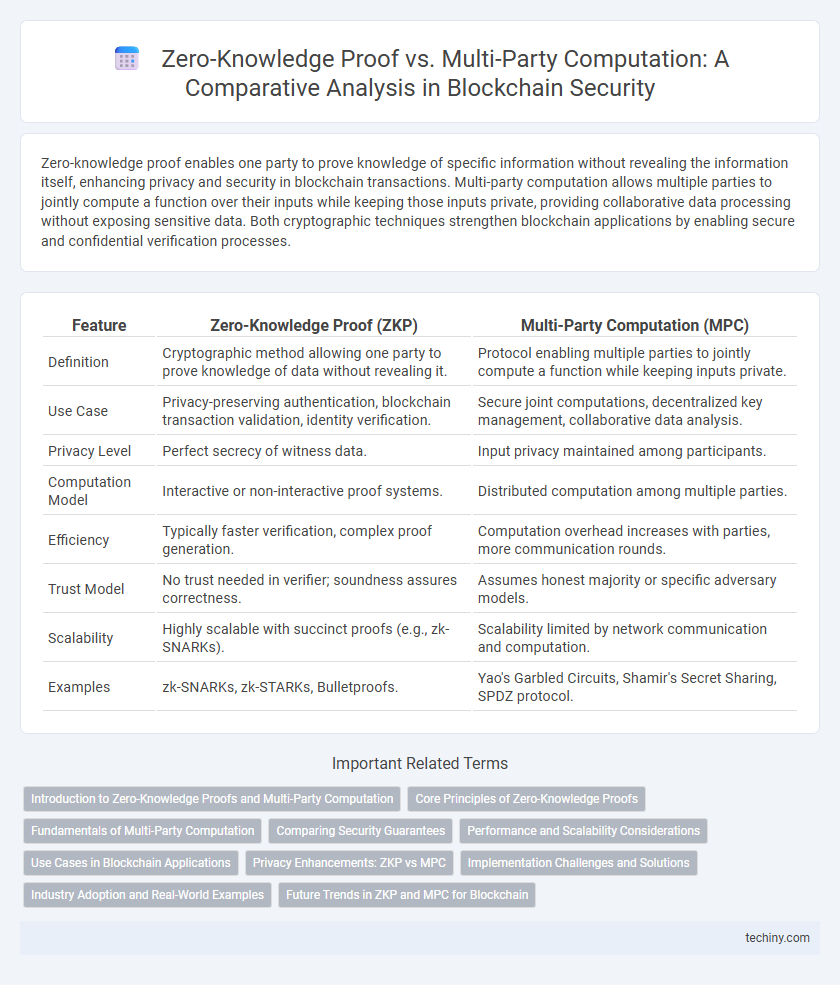Zero-knowledge proof enables one party to prove knowledge of specific information without revealing the information itself, enhancing privacy and security in blockchain transactions. Multi-party computation allows multiple parties to jointly compute a function over their inputs while keeping those inputs private, providing collaborative data processing without exposing sensitive data. Both cryptographic techniques strengthen blockchain applications by enabling secure and confidential verification processes.
Table of Comparison
| Feature | Zero-Knowledge Proof (ZKP) | Multi-Party Computation (MPC) |
|---|---|---|
| Definition | Cryptographic method allowing one party to prove knowledge of data without revealing it. | Protocol enabling multiple parties to jointly compute a function while keeping inputs private. |
| Use Case | Privacy-preserving authentication, blockchain transaction validation, identity verification. | Secure joint computations, decentralized key management, collaborative data analysis. |
| Privacy Level | Perfect secrecy of witness data. | Input privacy maintained among participants. |
| Computation Model | Interactive or non-interactive proof systems. | Distributed computation among multiple parties. |
| Efficiency | Typically faster verification, complex proof generation. | Computation overhead increases with parties, more communication rounds. |
| Trust Model | No trust needed in verifier; soundness assures correctness. | Assumes honest majority or specific adversary models. |
| Scalability | Highly scalable with succinct proofs (e.g., zk-SNARKs). | Scalability limited by network communication and computation. |
| Examples | zk-SNARKs, zk-STARKs, Bulletproofs. | Yao's Garbled Circuits, Shamir's Secret Sharing, SPDZ protocol. |
Introduction to Zero-Knowledge Proofs and Multi-Party Computation
Zero-knowledge proofs enable one party to prove knowledge of a secret without revealing the secret itself, enhancing privacy in blockchain transactions. Multi-party computation allows multiple participants to jointly compute a function over their inputs while keeping those inputs private, facilitating secure collaboration. Both cryptographic techniques improve security and confidentiality but differ in application scope and computational complexity.
Core Principles of Zero-Knowledge Proofs
Zero-knowledge proofs enable a prover to demonstrate possession of specific information without revealing the data itself, ensuring privacy and security through completeness, soundness, and zero-knowledge properties. This contrasts with multi-party computation, which allows multiple parties to jointly compute a function over their inputs while keeping those inputs private but requires all parties to be actively involved. Core to zero-knowledge proofs is their ability to verify correctness without disclosing any extra information, making them crucial for privacy-preserving blockchain applications.
Fundamentals of Multi-Party Computation
Multi-party computation (MPC) enables multiple participants to jointly compute a function over their inputs while keeping those inputs private, ensuring data confidentiality without revealing any individual input. MPC protocols rely on cryptographic techniques such as secret sharing and secure function evaluation to achieve distributed trust and prevent data leakage. This fundamental approach differentiates MPC from zero-knowledge proofs, which allow verification of knowledge without revealing the underlying data itself.
Comparing Security Guarantees
Zero-knowledge proofs (ZKPs) enable one party to prove knowledge of information without revealing the information itself, providing strong privacy guarantees by ensuring no data leakage. Multi-party computation (MPC) distributes computation across multiple parties, allowing joint data processing while keeping each party's inputs confidential, but with varying levels of trust assumptions depending on the protocol design. ZKPs typically offer stronger cryptographic guarantees against information exposure, while MPC provides flexible security depending on adversarial models and the number of honest participants.
Performance and Scalability Considerations
Zero-knowledge proofs (ZKPs) offer high efficiency with succinct proofs and minimal verification time, enabling scalable blockchain applications that require strong privacy guarantees. Multi-party computation (MPC) involves significant communication overhead among participants, which can limit performance and scalability in large networks. ZKPs generally provide better throughput and lower latency for decentralized systems, whereas MPC is more suited for collaborative computations with moderate scalability demands.
Use Cases in Blockchain Applications
Zero-knowledge proofs enable privacy-preserving verification of transactions in blockchain applications, allowing users to prove knowledge of data without revealing it, crucial for confidential payments and identity verification. Multi-party computation facilitates secure collaborative computations among untrusted parties, supporting decentralized finance protocols and cross-chain asset swaps by ensuring data privacy and correctness. Both technologies enhance blockchain scalability and security while addressing different aspects of trust and data confidentiality in decentralized environments.
Privacy Enhancements: ZKP vs MPC
Zero-knowledge proofs (ZKP) enable one party to prove knowledge of a secret without revealing the secret itself, significantly enhancing privacy by minimizing data exposure during verification. Multi-party computation (MPC) allows multiple participants to jointly compute a function over their inputs while keeping those inputs private, ensuring collaborative privacy without centralized trust. Both technologies provide robust privacy enhancements, with ZKP excelling in proving statements securely and MPC excelling in secure joint computations.
Implementation Challenges and Solutions
Zero-knowledge proof (ZKP) implementation faces challenges such as computational overhead and complex cryptographic assumptions, which are addressed by optimizing proof systems like zk-SNARKs and zk-STARKs for efficiency and scalability. Multi-party computation (MPC) struggles with communication latency and synchronization among distributed parties, solved through advanced protocols like threshold cryptography and asynchronous MPC frameworks. Both ZKP and MPC require robust key management and secure setup assumptions to ensure privacy and correctness in blockchain applications.
Industry Adoption and Real-World Examples
Zero-knowledge proofs (ZKPs) enable parties to verify information without revealing the underlying data, widely adopted in blockchain projects like Zcash and Ethereum for privacy and scalability. Multi-party computation (MPC) facilitates joint computations over private inputs, gaining traction in secure voting, financial multiparty agreements, and collaborative machine learning, with industry players such as Unbound Security and Partisia Blockchain driving real-world deployments. Industry adoption of ZKPs leads to enhanced privacy-preserving transactions, while MPC strengthens trust and security in decentralized applications and cross-organizational computations.
Future Trends in ZKP and MPC for Blockchain
Future trends in zero-knowledge proof (ZKP) and multi-party computation (MPC) for blockchain emphasize enhanced scalability and privacy through more efficient cryptographic primitives and protocols. Advances in recursive ZKPs and threshold MPC aim to reduce computational overhead while enabling complex decentralized applications with strong confidentiality guarantees. Integration of these technologies with layer-2 solutions and cross-chain interoperability will drive widespread adoption and innovation in secure blockchain ecosystems.
Zero-knowledge proof vs Multi-party computation Infographic

 techiny.com
techiny.com